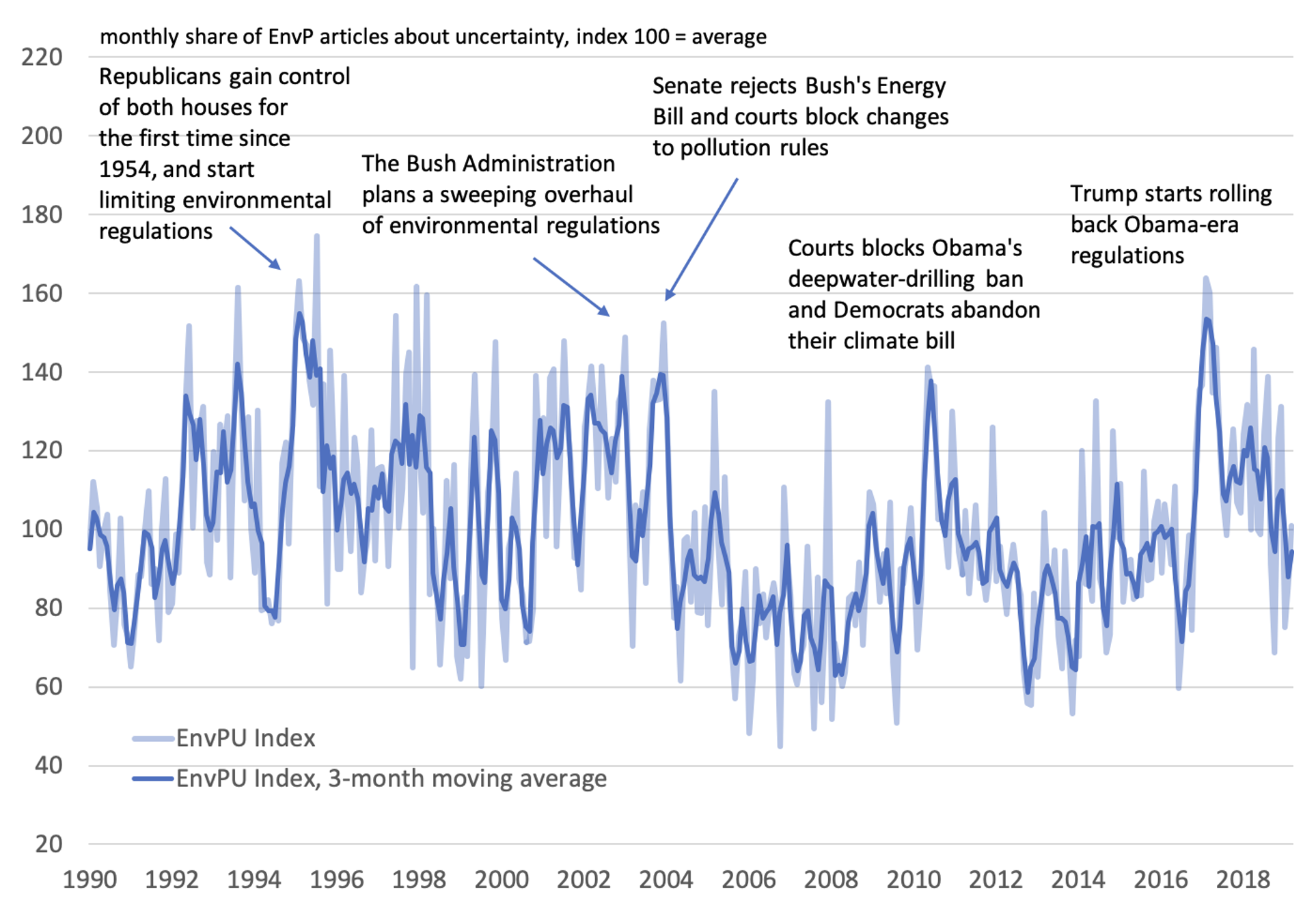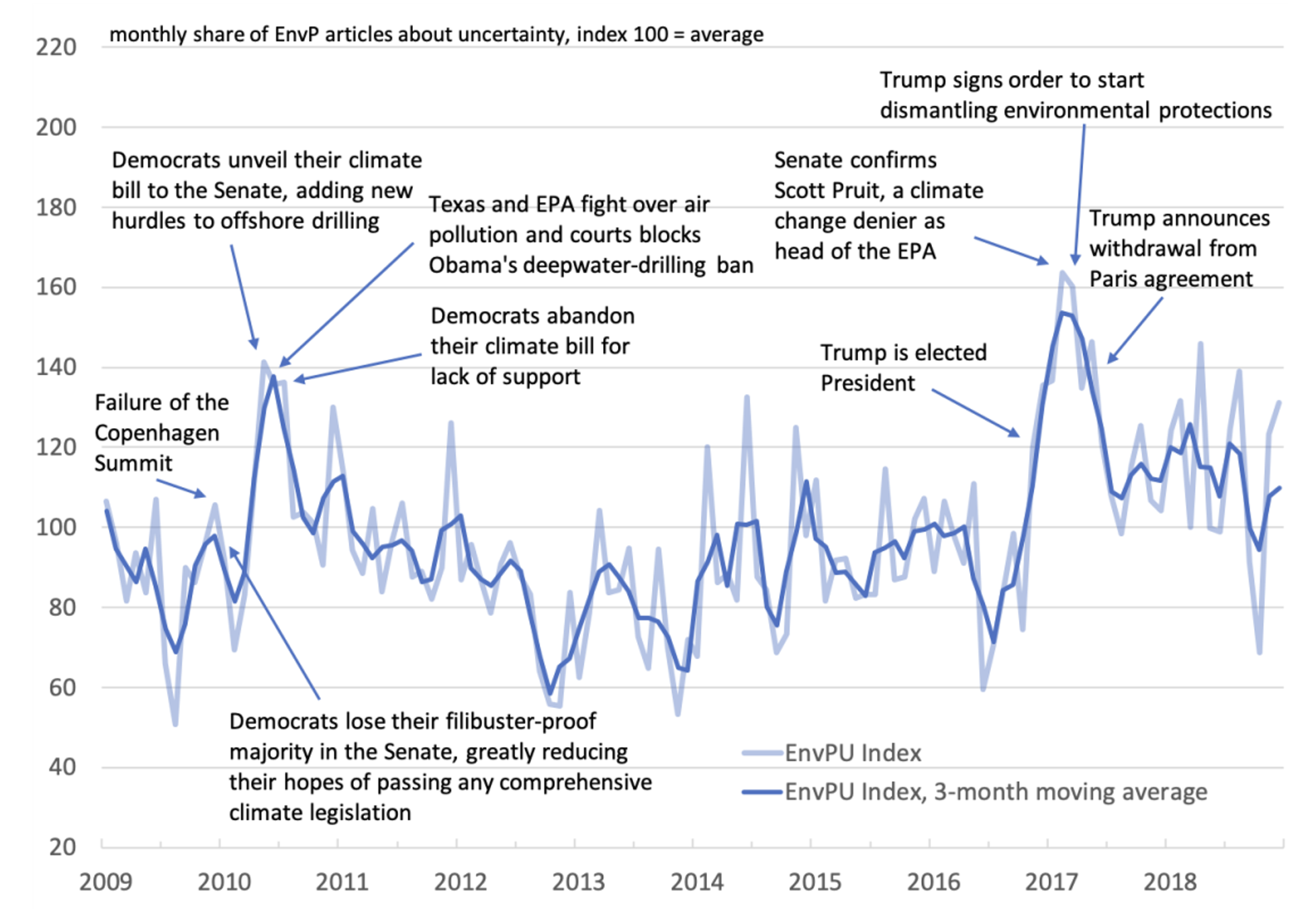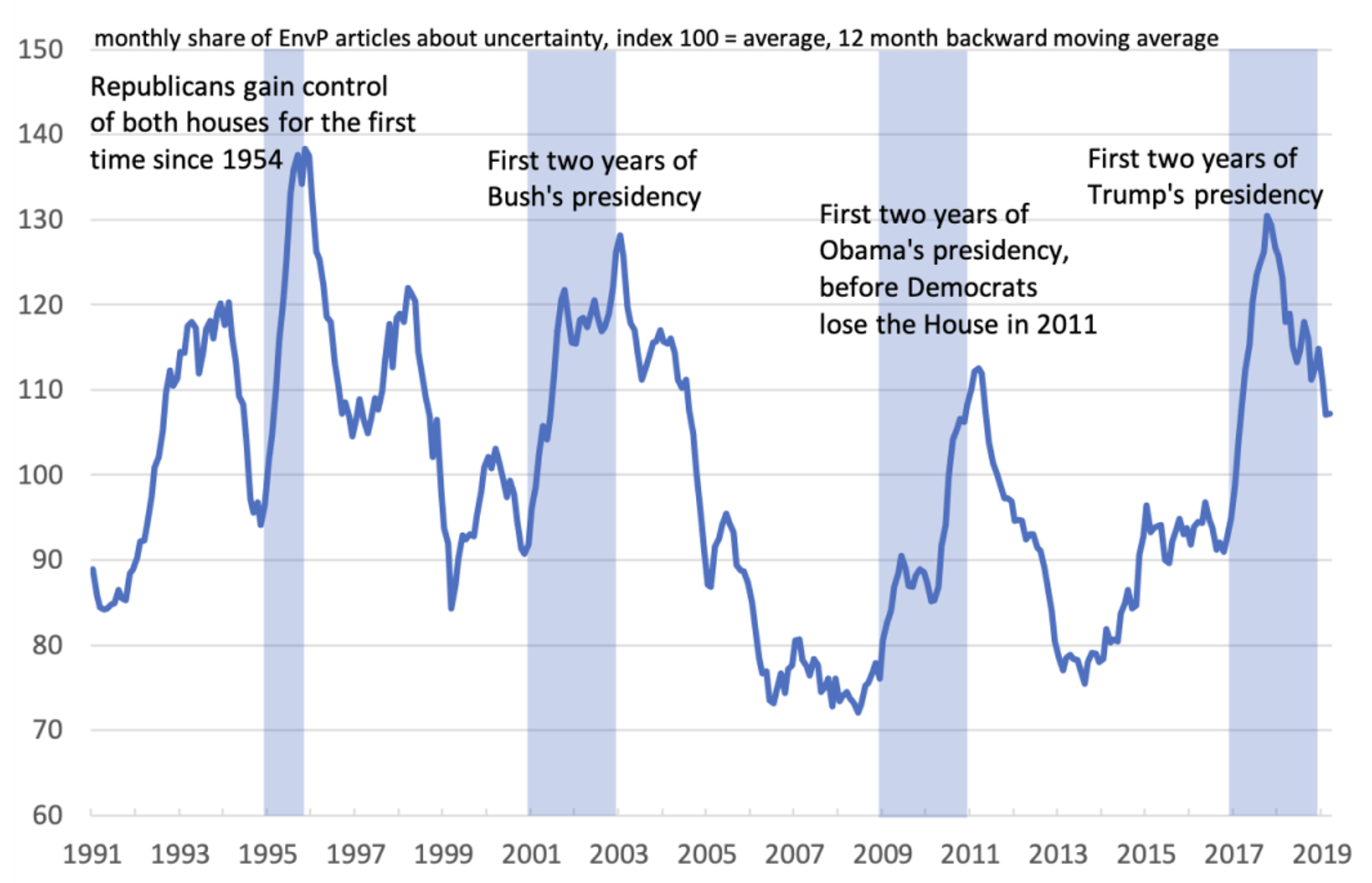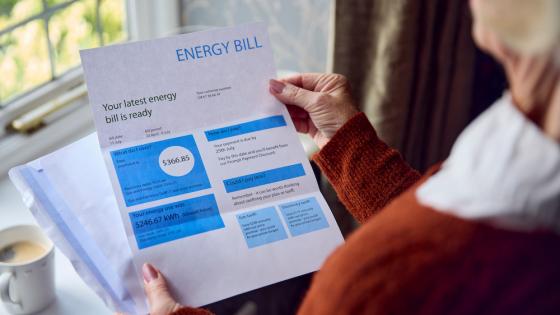In the midst of the current European energy crisis, several countries have recently backpedalled on coal phase-outs and shale gas moratoriums and started to massively subsidise the costs of oil and gas energy (Ilzetzki and Suryaansh 2022). These announcements represent an abrupt change of course from current energy policies pledging to reduce emissions to achieve the 2015 Paris Agreement on Climate Change, thereby leading to increased policy uncertainty about future climate action. Yet, a predictable regulatory framework is key to mobilising investments and financial flows for the low-carbon economy. In a survey by the European Investment Bank, 43% of European firms and 22% of US firms cite uncertainty about regulation as an important barrier to undertaking climate-related investment, notably above availability of finance (EIB 2021). To date, however, the absence of quantitative measure of environmental policy uncertainty has made it difficult to assess empirically the adverse effects of these regulatory risks on climate-related investments.
The Environmental and Climate Policy Uncertainty Index
In Noailly et al. (2022), we introduce a novel news-based index of US environmental and climate policy uncertainty: the Environmental and Climate Policy Uncertainty Index (EnvPU index). The index is available on a monthly basis from January 1990 to March 2019 and can be accessed freely at www.financingcleantech.com/envpu-index. The EnvPU index captures the monthly share of news articles relating to uncertainty about environmental and climate policy, among ten US newspapers spread across the country. The index is scaled by the total volume of environmental policy news, so that it remains unaffected by fluctuating media attention on general environmental issues. On top of the novel focus on environmental regulations, our methodology improves on previous news-based policy indices (Baker et al. 2016, Caldara et al. 2020) by relying on supervised machine learning algorithms to classify news articles rather than less sophisticated keyword-based methods.
Our index provides insights into the following question: What induces perceptions of increased uncertainty about environmental and climate regulations in the US context? The detailed reading of news articles shows that a variety of factors play a role: (1) unpredictable outcomes of the legislative process, (2) legal challenges of regulations awaiting court decisions, (3) unexpected revisions or rollbacks of policies, or (4) the failure of international environmental negotiations due to a lack of political will and supportive coalitions.
Many of these events are illustrated in Figures 1 and 2, which display the evolution of the EnvPU index over the 1990-2019 period and the more narrow 2009-2019 period (covering the Obama and Trump administrations), respectively. Spikes in the index correspond to well-known historical episodes of high environmental policy uncertainty in the US. For example, in December 1995, a disagreement over cuts in environmental regulations led to a government shutdown for several weeks. The early 2010s were also punctuated by several bursts of policy uncertainty. Driven by the introduction and eventual failure of a comprehensive climate bill aiming to introduce a nationwide cap-and-trade system, the EnvPU index rose to 40% above its average level during the summer of 2010. Around the same period, the failure of the COP15 in Copenhagen, legal challenges between Texas and the EPA and new rules regarding offshore drilling after the Deepwater Horizon oil spill created an additional burst in policy uncertainty. Finally, the EnvPU index surged to record-high levels (60% above its average) during the early months of the Trump presidency in 2017, reflecting the great degree of uncertainty about how far the Trump administration would roll back existing federal environmental regulations.
Figure 1 The EnvPU index, 1990–2019
Figure 2 The EnvPU index, focusing on the subperiod 2009–2019
We investigate the role of electoral cycles further and find that the EnvPU index closely tracks changes of power in US elections. Figure 3 shows, for instance, that our index rises in 1995 when the Republicans take back both houses of Congress for the first time in 40 years and in 2017 when President Trump takes office. After the transition of power took place and when actual environmental and climate policy plans of the new administration become clear (e.g. an increase or decrease in environmental regulations), policy uncertainty is resolved and the EnvPU index subsides at low levels.
Figure 3 Changes of power in US Congress and the EnvPU (12 months moving average)
Environmental policy uncertainty and low-carbon investments
Using our EnvPU index, we then study the relationship between environmental policy uncertainty and low-carbon investments. When investors have a hard time foreseeing the future evolution of the regulatory framework, they may either delay their investments until there is more clarity or invest in safer alternatives (Bloom et al. 2007, Paster and Veronesi 2013). Such a mechanism is likely to be particularly detrimental to investments in low-carbon markets, as these highly rely on public policies to be profitable due to the environmental externality.
Our firm-level results confirm that environmental policy uncertainty has adverse effects on funding for ‘cleantech’ startups. Using quarterly data on venture capital funding for 35,000 US startups from the Crunchbase database over the last 20 years, we find that an increase in our EnvPU index is associated with a lower probability of cleantech startups receiving funding in the following quarter (controlling for environmental policy stringency, GDP growth, the oil price and market risk). This effect is particularly concentrated among clean-energy startups characterised by capital-intensive and irreversible investments.
We also find that higher environmental policy uncertainty raises the volatility of stock returns of green firms, as measured by their annual green revenues shares. Using monthly data on stock returns of 438 listed US firms from January 2008 to March 2018, we find that there is a positive association between a shock to our EnvPU index and the contemporaneous within-firm stock volatility of green firms, compared to other firms. This might reflect higher perceived market risk by investors, potentially dampening investments in green firms.
Conclusions
The historical evolution of our EnvPU index for the US shows that environmental and climate policies are rarely predictable and consistent over time, as illustrated again by the recent European energy policy turnarounds. Yet, our results imply that elevated levels of environmental policy uncertainty threaten the establishment of robust markets for the low-carbon economy, further delaying urgent climate action.
Authors’ note: The views and opinions expressed in this column are strictly those of the authors, and do not necessarily represent the views or opinions of The Brattle Group (‘Brattle’) or any of its other employees or clients.
References
Baker, S R, N Bloom and S J Davis (2016), "Measuring Economic Policy Uncertainty", The Quarterly Journal of Economics 131(4): 1593–1636.
Caldara, D, M Iacoviello, P Molligo, A Prestipino and A Raffo (2020), "The economic effects of trade policy uncertainty", Journal of Monetary Economics 109: 38–59.
EIB - European Investment Bank (2021), European firms and climate change 2020/2021: Evidence from the EIB Investment Survey.
Ilzetzki, E and J Suryaansh (2022), "Assisting households facing rising energy costs", VoxEU.org, 10 November.
Pastor, L and P Vernosei (2013), ‘‘Political Uncertainty and Risk Premia,’’ Journal of Financial Economics 110: 520–545.
Noailly, J, L Nowzohour and M van den Heuvel (2022), "Does Environmental Policy Uncertainty Hinder Investments Towards a Low-Carbon Economy?", NBER Working Paper No. 30361.









